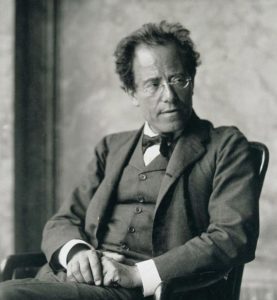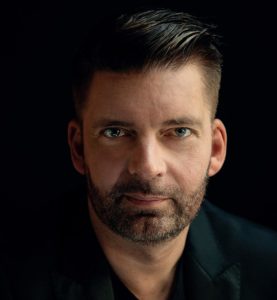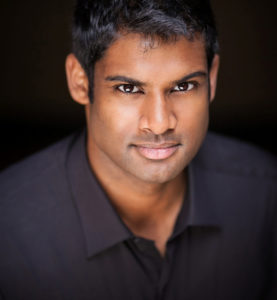Los Angeles Chamber Orchestra’s program of Transir for flute by Matthias Pintscher and Das Lied von der Erde (Song of the Earth) by Gustav Mahler was a powerful curation of two musical compositions. Both composers are known for taking risks and making bold choices – ushering in new sounds for orchestras. In a pre-concert talk flutist Henrik Heide said that both composers are detailed about phrasing, style and are specific about the music they conceive. Heide said Transir was the most difficult piece he ever played. When he first received the music, he was overwhelmed and didn’t think it could be done.
During the pre-concert talk both Pintscher and Heide discussed the process of conceiving music first in the head and using an instrument as a conduit. Most interesting of Pintcher’s disquisition that evening was his belief on how to listen to music. He explains, “You listen for what is inside yourself” and, “to find out something about yourself.”
Transir has a dream-like quality to it and brought up the notion that one either has a dream in color or black and white. Except for musicians – they must dream in technicolor and surround sound. Transir, for the flute begins with a dim sound from the distance like a beginning or an end; reminding us of the brevity of human life. In fact, the French translation of transir is pénétrer, meaning to pass through or transition.
Heide did an excellent job of playing the extended techniques. The notes and sounds emitted from the flute were ones I never heard nor thought could be done. I liked it very much.
Paired with Mahler’s Song of the Earth it compliments the extremities of life and death. Mahler began writing this masterpiece around 1908, but did not live to hear the work. He died at age 50. Six months after his death it was first performed in November of 1911. Mahler wrote the song cycle based on poems by Tang dynasty poet Li Bai (701-762) during a tragic and painful period in his life. Beginning in 1907, he was forced to resign as director of the Vienna Court Opera. An anti-Semitic campaign was launched by the mayor of Vienna and in the press, which wondered aloud if a Jew could maintain the German character of the opera. This malfeasance helped drive him from the company in 1907. Ironically, some years earlier, he deliberately converted to Catholicism, so he could conduct for the VCO. The institution had a bylaw preventing Jews from conducting. It wasn’t until the great maestro Leonard Bernstein lauded his work and made Mahler’s recognition soar. In fact, Leonard Bernstein called Das Lied von de Erde Mahler’s greatest work. Today, Mahler is considered one of the greatest composers of all time.
The structure of Das Lied von der Erde requires the two soloists to alternate; the first, third and fifth songs are sung by the tenor, while the second, fourth and sixth are sung by the mezzo-soprano. Three-time Grammy Award-winning mezzo-soprano Michelle DeYoung was wonderful. DeYoung, hailed for a voice that is “sheer magic” (Dallas Morning News), has established herself as one of the most exciting artists of her generation.
DeYoung’s voice radiates and she has the emotional quality necessary, especially when she sang “The Farewell” which is said to be Mahler’s farewell to life. This sixth song, mostly in c-minor, twenty-three minutes long is described by Pintscher as a “powerful tragic work in music history because the orchestra plays in three different layers, time signatures that are so abstract, totally floating on the other side already and marks transition.” And that’s why Pintscher appropriately chose the title Transir.
A heart-felt performance by acclaimed tenor Sean Panikkar who according to Opera News, continues “to position himself as one of the stars of his generation. His voice is unassailable—firm, sturdy and clear, and he employs it with maximum dramatic versatility.” Just recently, he made his debuts in the lead role of Philip Glass’s Satyagraha at Los Angeles Opera conducted by Grant Gershon and at the Salzburg Festival in a new production of Henze’s The Bassarids conducted by Kent Nagano. Additionally, he returns to the Festival d’Aix en Provence for a new production of Weill’s Aufstieg und Fall der Stadt Mahagonny directed by Ivo van Hove and conducted by Esa-Pekka Salonen.
The version tonight of Das Lied von der Erde, was orchestrated by Glen Cortese in 2014 and conducted by Pintscher, Music Director of Paris’ Ensemble Intercontemporain, the world’s leading contemporary music ensemble founded by Pierre Boulez.
This concert by Los Angeles Chamber Orchestra (LACO) was given on Sunday, March 3, 019 at Royce Hall, UCLA.
For more information on this concert.

Mezzo-soprano Michelle DeYoung

Henrik Heide, flute

Gustav Mahler

Composer/conductor Matthias Pintscher PHOTO CREDIT: Felix Broede

Sean Panikkar, tenor
Upcoming concerts visit LACO.






